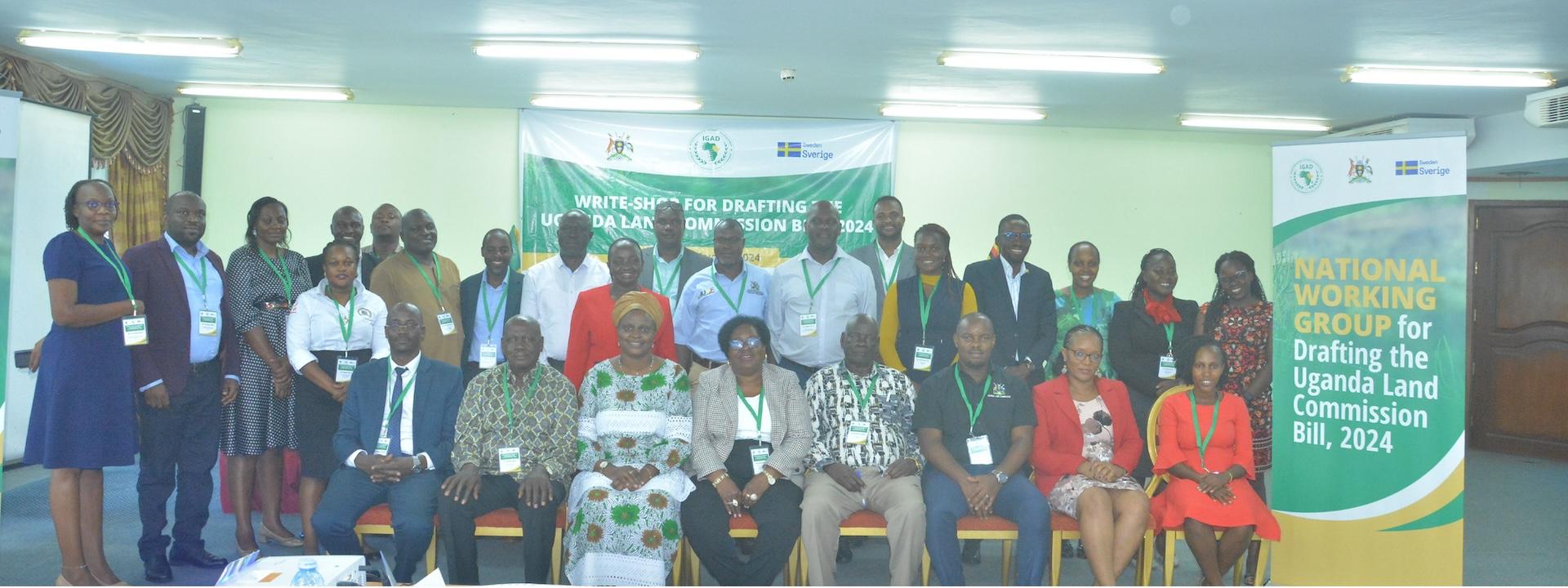August 7, 2024 (Entebbe, Uganda): The Intergovernmental Authority on Development (IGAD) through its Land Governance Program this morning in collaboration with the Ministry of Lands Housing and Urban Development and Uganda Land Commission (ULC) Working Group this morning embarked on the revision of the Draft Uganda Land Commission Bill to land align with current emerging trends in land governance in the country.
The Uganda Land Commission is mandated to hold and manage any land in Uganda vested in or acquired by the Government of Uganda in accordance with the provisions of the Constitution and has such other functions as may be prescribed by the Parliament of the Republic of Uganda.
The Commission’s objectives include; ensuring the effective and efficient management of all government land and property; developing and maintaining an updated inventory and database of all government land and property; ensuring that all government land is titled and secured; ensuring proper use and accountability of land fund and enabling bonafide and lawful occupants acquire registrable interest.
With the support from IGAD and in alignment with the Commission’s mandate and objectives, this meeting will endeavor to; review of the existing draft of ULC Bill and relevant documents and update the existing draft of ULC Bill to reflect current land governance issues, priorities and best practices in land management and administration in the IGAD Region.
In the welcoming remarks, Ms. Joselyn Bigirwa, the Acting Coordinator Land Governance Programme & Gender & Land Expert representing the Director of Agriculture and Environment expressed IGAD’s gratitude to the Republic of Uganda for giving IGAD the opportunity into creating a direct impact into what the Republic of Uganda is doing which falls directly under the mandate of the IGAD Land Governance Program to support the process of revising of Uganda Land Commission Bill 2024 to deliver their policy commitments in improving land governance in the country.
“We remain committed to supporting the Uganda Land Commission Bill 2024 and to seeing this process to its successful conclusion and implementation. We have continued to provide the platform for learning, knowledge exchange and sharing best practices between the Land Commissions in other IGAD Member states including Kenya and South Sudan for purposes of promoting coherence and convergence on Land issues in the IGAD Region,” said Ms. Bigirwa.
Ms. Bigirwa emphasized the importance of having Land Commission Bills that are gender responsive and balanced in the land architecture by having laws that are clear about the targets IGAD wants to achieve.
“We also want to ensure that in the delivering of the Land Fund we apply and take into account gender equality principles as a way of responding to gender inequalities in access to land and land compensation matters” Ms. Bigirwa added.
The opening of this pivotal meeting was officiated by Ms. Naomi Kabanda, Director of Land Management representing the Permanent Secretary of the Ministry of Lands, Housing and Urban Development, she expressed her gratitude to IGAD for supporting Member States in the development of Policy and Legal Frameworks, capacity building, learning and exchange visits in land administration and governance as well as the general support to the land sector and land regime.
“Your support to the Ministry and Uganda Land Commission to finalize the drafting of The Uganda Land Commission is timely as the Uganda Land Commission Bill is on the Government Legislative Agenda for the financial year 2024/25 after the approval of the Principles by Cabinet in 2013. I urge you to take keen interest in Uganda Land Commission Bill 2024 and ensure all input from the different stakeholders be considered in order to fast track its finalization” Ms. Kabanda added.
She urged that as the ULC Bill Working Group to ensure the Bill 2024 addresses all the principles, key issues and the core functions as was approved by the Cabinet of the Commission such as; streamlining acquisition and disposal of government land; clarifying the mandate of the Commission in regards to government land management and land fund; clarifying the roles and responsibilities of government land users and determining sanctions for non-compliance among others.
The IGAD Land Governance Program in its second phase is funded by the Swedish Embassy-Ethiopia towards “Realizing transnational land governance in the IGAD region through capacity development on innovations in land administration, land use and management, strengthening gender equality and youth empowerment”

